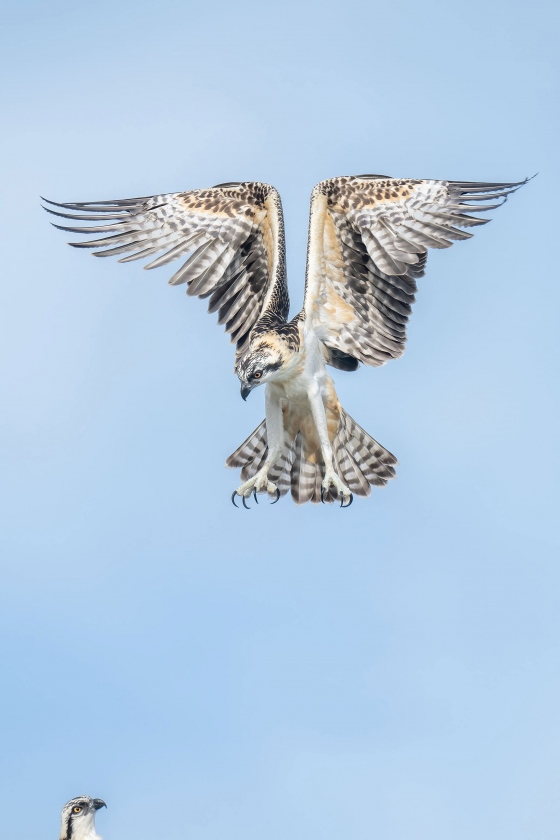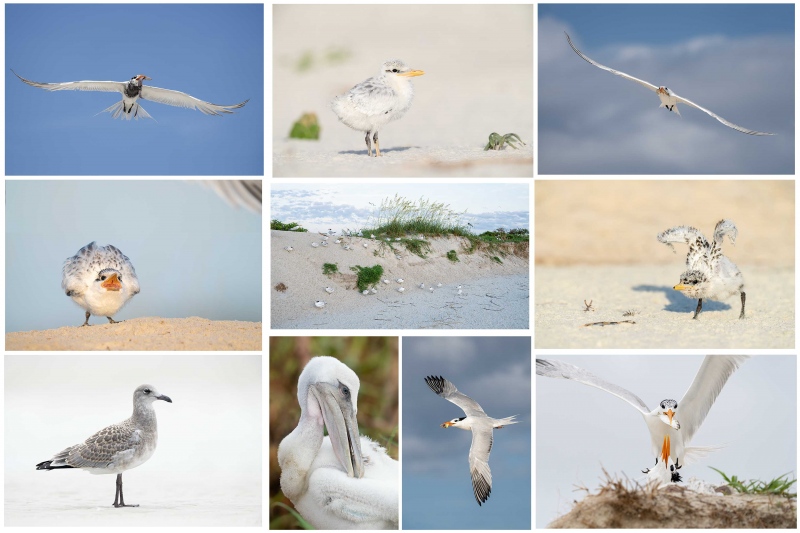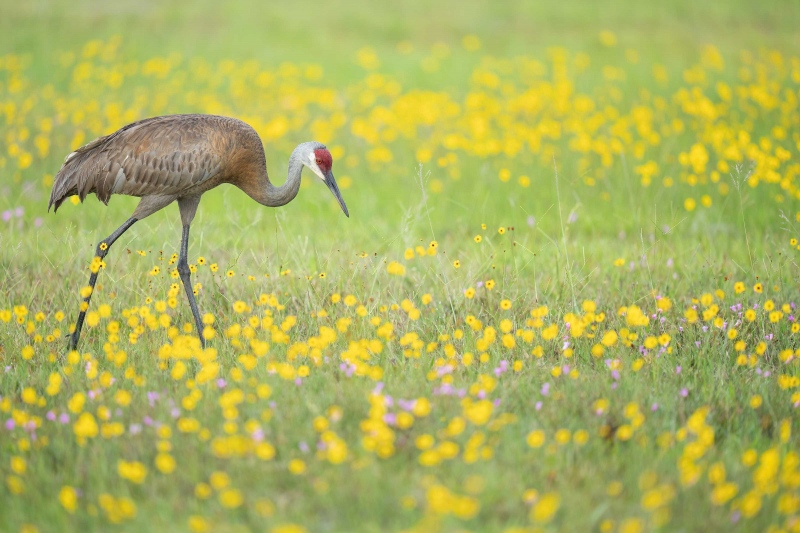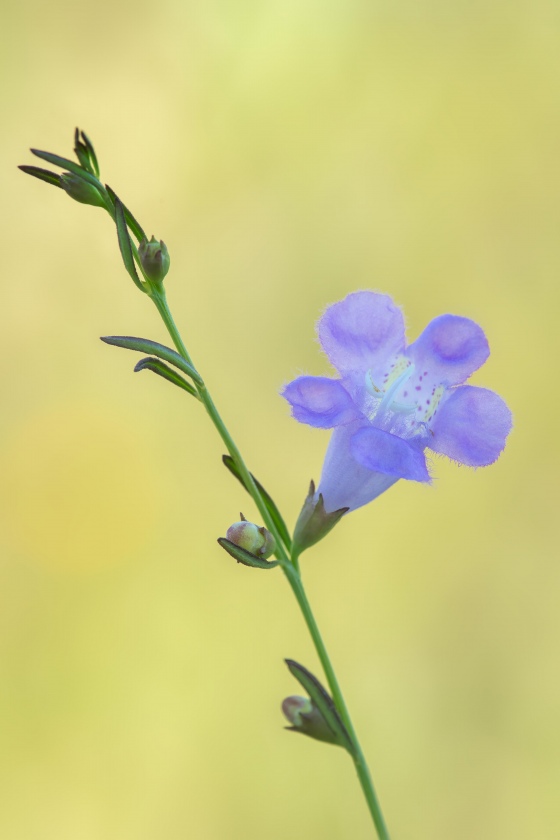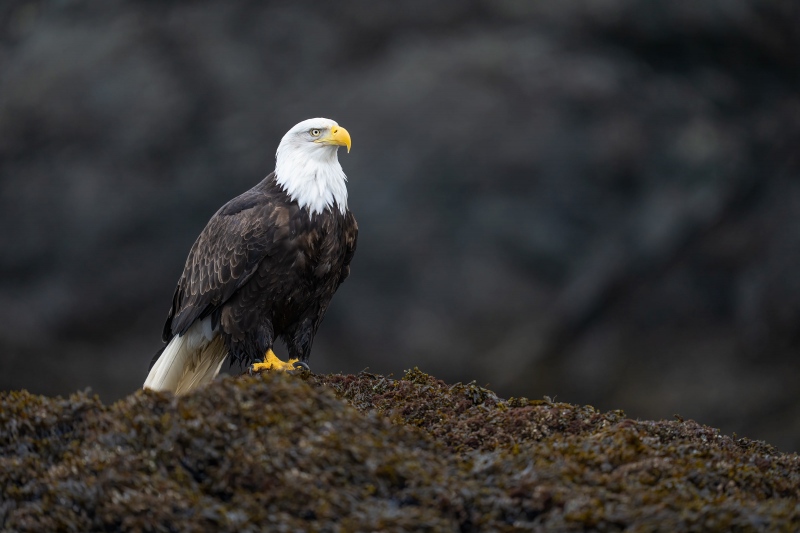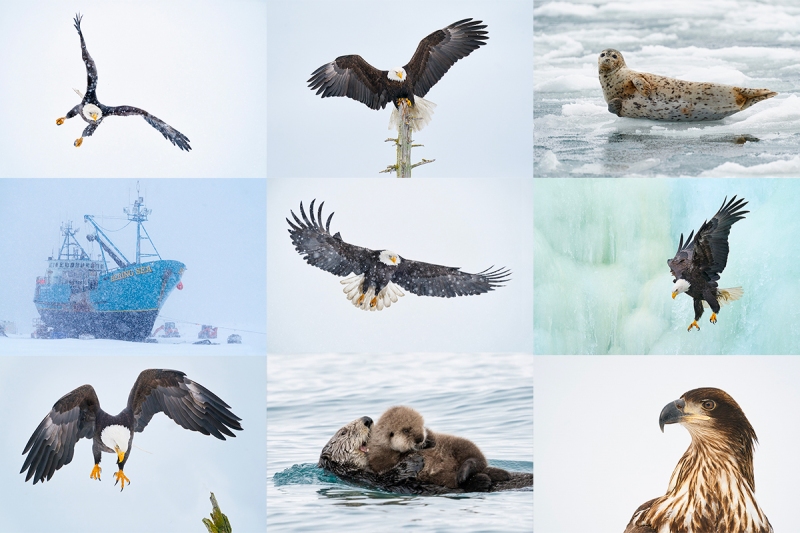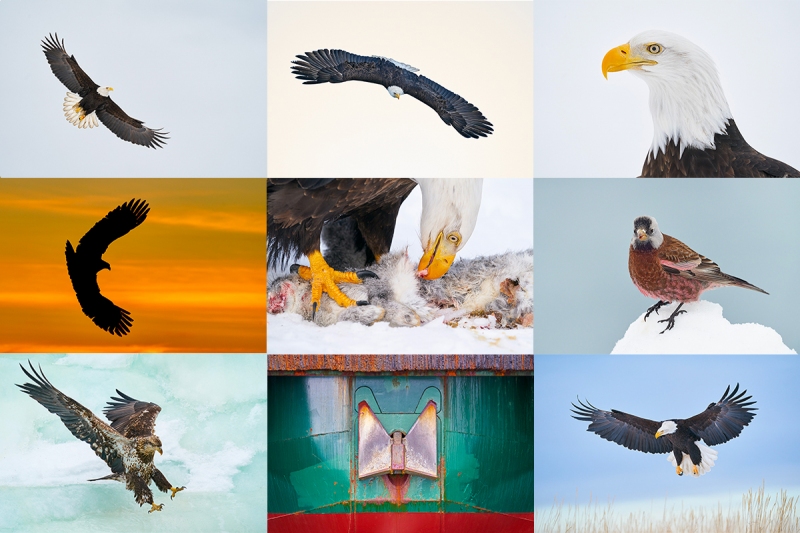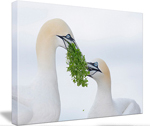What’s Up?
Photography was so good on Monday morning (1879 images created) that I never made it south of the pier. On Sunday morning there were two eggs in the Killdeer nest. Less than 24 hours, there were two tiny chicks being brooded by mom. I created 42 images of the adult with one of the chicks. Those included exactly one good one, the lightest of a series of three bracketed images. I will share that one with you here soon. Again, the two Wild Turkey hens were corralling about a dozen poults in the North Field. It is very close to impossible to make a good image of the little ones as the grasses and flowers are taller than they are. Not to mention that they are never still for more than a second.
Yesterday morning, as I drove toward the pier, one of the young Ospreys in the shorter of the two nests atop the poles was flapping like mad while exercising its wings. By the time I stopped and set up, it quit. Monday morning I struck gold with cloudy bright skies, a nice wind from the ENE, and lots of action. Two of the young in that same nest were flapping like mad, often getting a foot or two (or more!) above the nest. At first I was clipping wings like crazy. Rather than remove the TC, I opted to move back to reduce the angle of inclination. It seems likely that several of the young Ospreys should be flying in a day or two.
Today is Tuesday 31 May 2022. The forecast for this morning is for mostly sunny skies with a nice breeze from the ENE. I will be heading down to the lake early. Wherever you are and whatever you are doing, I hope that you too have a great day. This blog post took about an hour to prepare and makes seventy-seven days in a row with a new one.
Please remember to use the B&H and Amazon links that are found on most blog pages and to use the BIRDSASART discount code at checkout when purchasing your new gear from Bedfords. Please, also, consider joining a BAA IPT. You will be amazed at how much you will learn! Shoot me an e-mail for Jackson IPT#1 late registration details.
Induro GIT 304L Price Drop
Amazingly, we have two, brand-new-in-the-box Induro GIT 304L tripods in stock. They are $749.00 (was $799.00) and now includes the shipping to lower 48 states. Weekday phone orders only: 863-692-0906.
Wanted to Buy
If you have an old tripod that is sitting around gathering dust, or any Canon series III teleconverters, the 1.4X III or the 2X III, please shoot me an e-mail if you are interested in turning them into cash. I have an interested buyer.
Canon RF 100-500mm f/4.5-7.1 L IS USM Lens
BIRDS AS ART Record Low Price
Sale Pending Instantly
IPT veteran Sandra Calderbank is offering a Canon RF 100-500mm f/4.5-7.1 L IS USM lens in like-new condition for a BAA record-low $2299.00. The sale includes the original product box and everything that came in it, a LensCoat, the soft case, and insured ground shipping via major courier to lower-48 US addresses only. Your item will not ship until your check clears unless other arrangements are made.
Please contact Sandra via e-mail or by phone at 1-828-412-1047 Eastern time zone.
I used this lens for four months. I loved it. It is extremely versatile. Topaz DeNoise AI makes the f/71 aperture a non-issue. It accepts the RF Extender 1.4X (teleconverter) as long as you are zoomed out to 300mm. Though it sells new for $2899.00, it is out of stock almost everywhere. Be the one to grab Sandy’s lens and put $600 in your pocket while enjoying a pretty much new lens.. artie
Covering a variety of telephoto focal lengths, the Canon RF 100-500mm f/4.5-7.1 L IS USM spans a short- to super-telephoto range within a sleek and portable form factor. The modest maximum aperture enables a relatively portable design that is well-suited to handheld, walkaround use and optical image stabilization also helps to steady photos and videos by up to five stops when working in difficult lighting conditions. This lens is also characterized by its advanced optical design, which includes a series of Super UD and UD elements to greatly reduce chromatic aberrations and color fringing throughout the zoom range for a degree of clarity and color accuracy.
Balancing the distinguished optical assets is the Dual Nano USM focus system, which delivers fast, nearly silent autofocus performance with full-time manual focus override. A unique Control Ring is also integrated into the lens design for intuitive control over exposure settings from the lens itself and the rotating zoom ring also feature torque adjustment for fine-tuning the feel of the lens. Additionally, this 100-500mm is weather-sealed and has a fluorine coating to protect the front and rear elements. B&H & Canon
|
|
|
This image was created on 30 May 2022 at Indian Lake Estates, FL. Standing at full height I used the no longer available Induro GIT 304L/Levered-clamp FlexShooter Pro-mounted Sony FE 600mm f/4 GM OSS lens with the Sony FE 1.4x Teleconverter, and The One, the Sony Alpha 1 Mirrorless Digital Camera.. ISO 1250. The exposure was determined by Zebras with ISO on the rear wheel: 1/2500 sec. at f/5.6. (wide open) in Manual mode. AWB at 8:22:28am on a cloudy-bright morning with a nice east wind. Tracking: Spot S AF-C with Bird-Eye/Face Detection performed perfectly. Click on the image to enjoy the high-res version. Young Osprey exercising its wing above the nest platform while one sibling looks on, seemingly in wonder. |
Do You Have a Title?
Here’s my title: Just what are you doing up there?
If you have a title that you would like to share, please leave it in a comment below.
|
|
|
Click on the composite image to enjoy the incredible quality of the hi-res JPEG. Clockwise from upper left clockwise and back around to the center: Royal Tern in flight with squid for chick; Royal Tern chick on beach; Royal Tern in flight with shrimp for young; Royal Tern chick — double overhead wing stretch; Royal Tern landing with greenback for chick; Royal Tern in flight with juvenile mahi mahi for chick; Brown Pelican — large chick preening; Laughing Gull in fresh juvenal plumage; Royal Tern chick begging; Many Royal Terns with many chicks on face of dune. |
Jacksonville IPT: #1: 4 FULL DAYS — the afternoon of 16 June thru the morning of MON 20 June 2022: $2,099.00. (Limit 6 photographers)
Jacksonville IPT #2: 4 FULL DAYS — the afternoon of FRI 1 JULY thru the morning of TUES 5 July 2022: $2099.00 (Limit 6 photographers)
Jacksonville IPT #3: 4 FULL DAYS — the afternoon of FRI 15 JULY thru the morning of TUES 19 July 2022: $2099.00 (Limit 6 photographers/Openings: 5)
Ride with me: add $200.00. I do not like to disappoint: each trip will run with one participant. If necessary.
I first visited the breeding bird colony at Jacksonville in late June 2021. I was astounded. There were many thousands of pairs of Royal Terns nesting along with about 10,000 pairs of Laughing Gulls. In addition to the royals, there were some Sandwich Terns nesting. And there are several dozen pairs of Brown Pelicans nesting on the ground. Flight photography was non-stop astounding. And photographing the tern chicks was relatively easy. Folks could do the whole trip with the Sony 200-600, the Canon 100-500 RF, or the Nikon 500 PF or 200-500 VR. With a TC in your pocket for use on sunny days. Most of the action is within 100 yards of where we park (on the beach). As with all bird photography, there are times when a super-telephoto lens with either TC is the best tool for the job.
Morning sessions will average about three hours, afternoon sessions about 1 1/2 hours. On cloudy mornings with favorable winds, we may opt to stay out for one long session and skip the afternoon, especially when the afternoon forecast is poor. Lunch is included on the first three days of the IPT and will be served at my AirBnB. After the first lunch there will be an introductory program. On days two and three we will do image review and Photoshop after lunch.
We will be based somewhere west and a bit north of Jacksonville where there are many AirBnB possibilities. The deposit is $599.00. Call Jim at the office any weekday at 863-692-0906 to pay by credit card. Balances must be paid by check.
What You Will Learn on a Jacksonville IPT
- 1- First and foremast you will learn to become a better flight photographer. Much better.
- 2-You will learn the basics and fine points of digital exposure. Nikon and Canon folks will learn to get the right exposure every time after making a single test exposure, and SONY folks will learn to use Zebras so that they can be sure of making excellent exposures before pressing the shutter button.
- 3- You will learn to work in Manual exposure mode even if you fear it.
- 4- You will learn to evaluate wind and sky conditions and understand how they affect bird photography, especially the photography of birds in flight.
- 5- You will learn several pro secrets (for each system) that will help you to become a better flight photographer.
- 6- You will learn to zoom out in advance (because the birds are so close!) 🙂
- 7- You will learn how to approach free and wild birds without disturbing them.
- 8- You will learn to spot the good and the great situations.
- 9- You will learn to understand and predict bird behavior.
- 10- You will learn to design pleasing images by mastering your camera’s AF system.
- 11- You will learn to choose the best perspective.
- 12- You will learn to see and control your backgrounds.
- 13- You will learn to see and understand the light.
- 14- You will learn to see and create pleasing blurs in pre-dawn situations.
- 15- You will learn to be ready for the most likely event.
And the best news is that you will be able to take everything you learn home with you so that you will be a better photographer wherever you are and whenever you photograph.
Typos
With all blog posts, feel free to e-mail or to leave a comment regarding any typos or errors.

